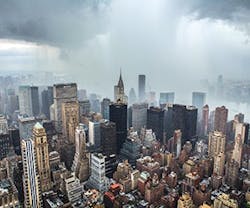Code Changes Forthcoming for Building Resiliency
New code changes are underway that will strengthen buildings in the face of adverse weather.
In response to the aftermath of Superstorm Sandy, the Urban Green Council is pushing for code additions that address resilient building design and emergency preparedness.
The Building Resiliency Task Force outlines over 30 proposals that are currently being considered by the City Council. The recommendations take form as new codes, clarifications to existing ones, and voluntary best practices.
Enacted Measures
Sewage Valves – Valves prevent sewage backflow into basements during rainstorms and floods, minimizing damage to below-grade levels and keeping potentially toxic or hazardous waters from entering the building.
As part of the plumbing code, the drains in buildings located in Special Flood Hazard Areas (as defined by the Building Code) must be equipped with a backwater valve at the point of exit from the building and downstream from the building trap.
Reliable Sanitation – Equipped with a manual override or long-lasting batteries, automatic toilets will still flush during blackouts. This will assist with occupants sheltering in place and reduce sanitation risks.
Under this new requirement, at least one faucet and one toilet in each bathroom must be capable of operating without external electrical power for at least two weeks.
Voluntary Practices
Backup Power – Owners should prioritize which electrical equipment will run on backup power so buildings can remain habitable during extended blackouts.
They should also consider alternatives to traditional diesel generators, such as cogeneration, solar, and natural gas generators, which are more eco-friendly.
Emergency Recovery Agreements – Finding service providers and negotiating agreements can delay recovery for damaged buildings.
As part of emergency planning, property owners and managers should identify service providers and pre-negotiate emergency recovery agreements.
Building Water Reserves – Water towers can provide potable water during power losses because the water stored in the tank can be distributed using gravity, not power.
Despite city regulations allowing the opposite, building owners are encouraged to maintain existing water towers and consider using water towers in new construction.
